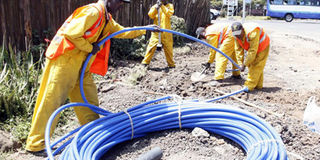New rules to harmonise set-up of key infrastructure

Workers lay fibre optic cables om Mara Road in Upper Hill Nairobi on January 5, 2009. Telkom Kenya’s contract to manage the State-owned inland fibre optic network hangs in the balance after an audit noted that the project was mismanaged and could not sustain itself. PHOTO | FILE
What you need to know:
- Technology is rapidly being used into all aspects of life, resulting in the need for infrastructure such as telecom cables, distribution cabinets, towers and data centres have now become critical infrastructure.
- The proposed law therefore seeks to put in place an all-inclusive approach in the planning, designing and implementation of key infrastructure including those related to ICT.
A new law aimed at coordinating and harmonising construction of key infrastructure is in the offing.
The Critical Infrastructure Protection Bill is being crafted by ministries of ICT, Transport and Infrastructure as well as Energy and Petroleum. These ministries are the major implementers of key infrastructure in the country.
The new rules have been necessitated by increasing number of ICT infrastructure projects. Major projects have traditionally been roads, power lines and water systems.
However, technology is rapidly being used into all aspects of life, resulting in the need for infrastructure such as telecom cables, distribution cabinets, towers and data centres have now become critical infrastructure.
Currently the deployment, maintenance and protection of these critical infrastructures are not coordinated, leading to disruption of essential services and losses due to accidental damage or need for relocation.
HIGH INTERNET PRICES
“It is on this basis that the government and the private sector have considered it necessary to come up with a legislation to guide the implementation and management of critical infrastructure,” the ministries said.
The proposed law therefore seeks to put in place an all-inclusive approach in the planning, designing and implementation of key infrastructure including those related to ICT.
The ICT sub-components would be integrated in the traditional infrastructure such as roads, sewage and railway lines.
The Bill would also address matters such as high wayleave fee and annual access fees demanded by local authorities and building owners. This has led to high internet prices.
Local authorities charge Sh200,000 for a two-kilometre cable in wayleave fees while building owners ask for as much as Sh400,000 annually to allow fibre connectivity in their premises.
This cost is passed on to consumers in bandwidth charges.
“Fibre optic cables laid by private investors are highly vandalised because of low enforcement in the country,” said Telecommunications Service Providers of Kenya chief executive Fiona Asonga.
The taskforce will be chaired by Ms Alice Kariuki, Airtel Africa Group Regulatory Director.
— MyGov.co.ke




